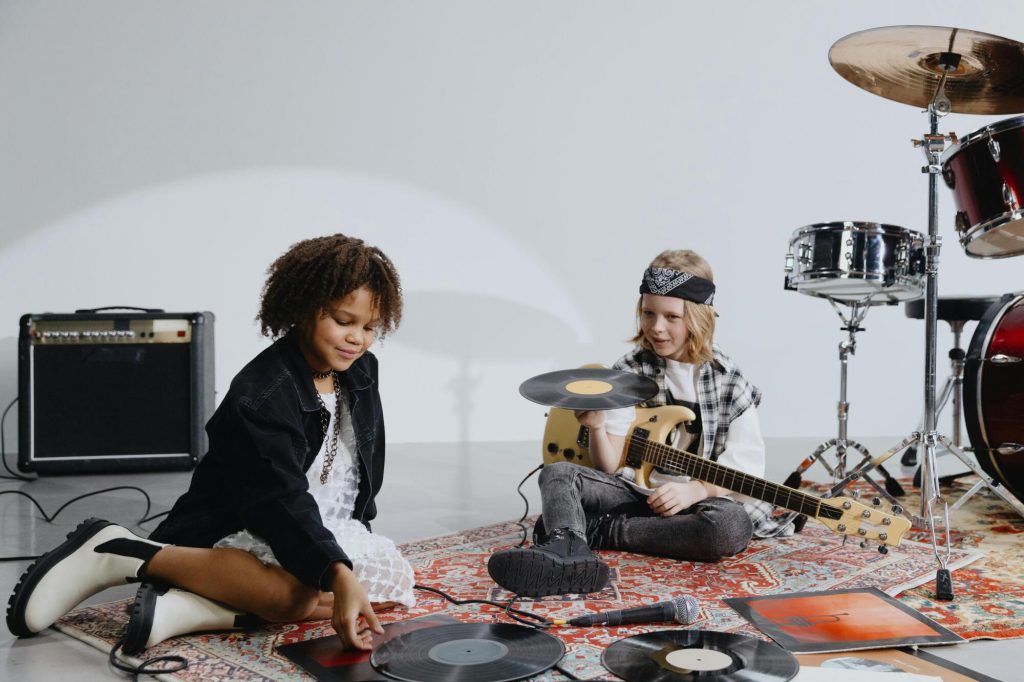Have you ever wondered how music can shape the mind?
Music education does more than teach rhythm and melody. It helps students develop focus, memory, and problem-solving skills. Learning to play an instrument trains the brain to think in patterns and sequences. These skills can improve learning in other subjects too.
Through regular practice, students also build patience and creativity. Music becomes more than sound, it becomes a tool for mental growth and lifelong learning.
Let’s explore how music education strengthens the mind in powerful ways.
Boosts Memory Skills
Music helps the brain stay active and sharp. When students learn songs or play instruments, they use patterns, notes, and rhythms. These steps train the brain to store and use information better. Each practice session helps students build stronger memory skills.
Repeating a melody or rhythm also helps the brain hold details longer. This makes it easier for students to recall facts or lessons in school. The more they practice music, the better they get at keeping track of what they learn.
Reading musical notes strengthens focus and memory together. Students must look at symbols and turn them into sound, which takes both thinking and coordination.
Over time, this training helps in other subjects too. Students who study music often find it easier to learn words, facts, and math patterns.
Improves Focus and Attention
Learning music trains the mind to stay alert. When playing an instrument or singing, students must follow timing, pitch, and rhythm closely. This teaches them to focus on one thing at a time.
Music also helps with patience. Students must practice the same piece until they get it right. This habit of focusing and staying calm helps them in class and other daily tasks.
When playing in groups, students need to listen to others. They follow cues and stay in sync, which improves attention and teamwork.
In time, music makes the mind sharper. It helps students finish work faster and stay focused longer. These skills are useful not only in music but in every part of life.
Develops Problem-Solving Skills
Music helps students learn how to solve problems. When they face a hard rhythm or song, they find ways to fix it. This builds patience and confidence.
Mistakes are part of learning. Musicians listen, find what went wrong, and try again. Each small step helps them think clearly and stay calm when solving problems.
Working in a group also builds teamwork. Students share ideas and help one another fix timing or sound. They learn how to listen, cooperate, and make decisions together.
Music teaches that there is more than one solution. By trying new ways to improve, students become creative thinkers. These lessons help them solve problems in and out of school.
Encourages Language Development
Music and language work closely together in the brain. Singing helps students learn rhythm, tone, and clear speech. It improves how they listen and how they express words.
At ExcellED Montessori Plus, music supports early learning. Children explore sounds and songs through fun, hands-on lessons. This helps them build strong speaking and listening skills from a young age.
Learning songs also helps students grow their vocabulary. They hear new words, understand meanings, and use them in daily speech.
Music gives students confidence to express themselves. They learn to listen to others and share ideas clearly. These skills make language learning easier and more enjoyable.
Enhances Mathematical Thinking
Music and math share many ideas. Counting beats and reading rhythms help students understand numbers and patterns. These activities build a stronger sense of order and logic.
When playing instruments, students use timing and division, just like solving math problems. They learn how small parts fit together to make a whole.
Music reading also trains the brain to see patterns quickly. It teaches how notes and spaces follow rules, much like equations.
Students who study music often do better in math. The focus and problem-solving skills they gain from music help them solve math tasks with ease.
Promotes Emotional Intelligence
Music helps students understand their feelings. Different songs can express joy, sadness, or calm. This teaches children how to identify and manage emotions.
Playing in a group builds empathy and teamwork. Students must listen and adjust to each other’s sound. This helps them learn patience and respect.
Music also gives students a safe way to express what they feel. They can show emotion through rhythm or melody instead of words.
Over time, students become more confident and emotionally balanced. They learn how to connect with others and handle challenges with care and kindness.
Strengthens Coordination and Motor Skills
Playing instruments helps both the brain and body work together. Students use their hands, eyes, and ears at the same time. This builds strong coordination and focus.
Fine motor skills improve as students move their fingers to play notes. Regular practice makes their movements smoother and faster.
Group music or dance lessons also help balance and timing. Students learn how to stay in rhythm while moving with others.
These skills help in everyday tasks too. Better coordination improves writing, sports, and focus. Music helps students grow strong, confident, and in control of their actions.
Builds Creative Thinking
Music opens the door to imagination. When students create or change a melody, they learn to think in new ways. This builds creativity and confidence.
Music allows freedom to express ideas. Students can shape sounds, moods, and rhythms in their own style. It helps them see that there is no single right answer.
Practicing music mixes both logic and creativity. Students use structure but also explore new sounds and ideas. This balance makes their minds flexible and curious.
Music encourages bold thinking and discovery. It teaches students that mistakes can lead to new ideas. Creativity through music helps them grow into innovative and open-minded thinkers.
Music Education: The Power of Music in Learning
Music education does more than create skilled performers. It helps students think clearly, stay focused, and express their emotions in healthy ways. Through practice and creativity, young learners build confidence and gain skills that help them in school and in life.
Music also brings joy and connection, allowing students to work together and grow through shared experiences. It strengthens both the heart and mind, shaping balanced and thoughtful individuals. With the right support, music can inspire a lifelong love of learning and open the path to a brighter future.
Make sure to check out the rest of our blog for more tips on various topics.







